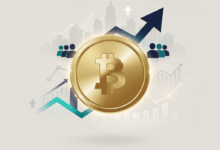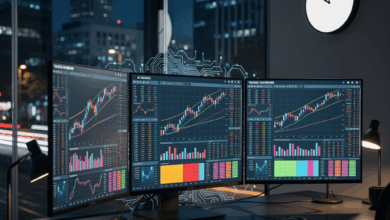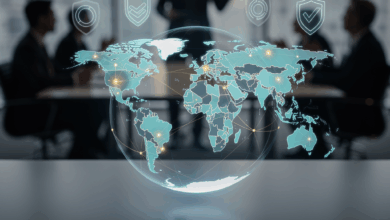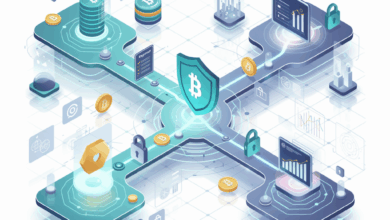The Quiet Surge – Are Online Master’s Degrees in AI and Cybersecurity Shaping Tomorrow’s Careers?

Have you ever paused to wonder why suddenly so many online master’s programs are spotlighting artificial intelligence or cybersecurity? I caught myself scrolling through course catalogs recently, intrigued by titles that seemed more like science fiction—”Machine Learning for Decision Making,” “Ethical Hacking and Network Defense.” It felt like an invitation into a world that’s no longer just about theory but about immediate, practical impact.
This isn’t just a fad. The surge in these emerging fields—AI, cybersecurity, sustainable energy, health informatics, and data science—is more than a trend; it’s a reflection of our rapidly evolving world. Recent reports highlight that industries are desperate for professionals who can navigate complex digital landscapes, protect against escalating cyber threats, and drive sustainable solutions. For instance, one article I stumbled upon from businessnewsthisweek.com pointed out that AI and machine learning are reshaping sectors from healthcare to finance at an unprecedented pace. Meanwhile, cybersecurity experts are now the frontline defenders in our increasingly connected lives (businessnewsthisweek.com).
But what does this mean for those of us considering further education? These programs aren’t just about adding a line to your resume; they’re about stepping into roles that could influence the very fabric of society. The interdisciplinary nature of these degrees—blending technical know-how with ethics, policy, and real-world applications—suggests they’re designed to prepare students for challenges we can barely predict.
Could this be the moment where online learning truly matches the pace of global change? If so, how might engaging with these programs change your perspective on education and career growth? As we navigate this quiet surge, it feels less like watching a wave approach and more like standing at the edge, wondering if we’re ready to dive in.
So, what do you think? Are these emerging online master’s fields the gateway to future-proofing your career, or just another educational buzz? Perhaps the real question is how we, as lifelong learners, choose to meet the shifting tides of opportunity and uncertainty.
Why Are AI and Cybersecurity Suddenly Everywhere in Online Master’s Programs?
I remember the first time I noticed the explosion of courses around topics like artificial intelligence and cybersecurity in online master’s catalogs. It was almost surreal—titles that sounded like scenes from a futuristic movie: “Deep Learning Applications,” “Advanced Ethical Hacking,” “Sustainable Energy Systems.” At first, I wondered if this was a marketing gimmick or a genuine shift. But the more I looked, the clearer it became that this wasn’t just hype.
Recent studies and articles, like one from businessnewsthisweek.com, reveal that AI and machine learning are no longer confined to tech labs—they’re driving transformations in healthcare, finance, and even creative industries. Simultaneously, the rise of cyber threats has pushed cybersecurity to the forefront, making experts in this field indispensable (businessnewsthisweek.com).
The Interdisciplinary Nature More Than Just Tech Skills
What’s fascinating is how these emerging programs blend disciplines. AI courses don’t just teach algorithms; they explore ethics and policy, recognizing that technology doesn’t exist in a vacuum. Similarly, sustainable energy degrees combine science, business, and environmental studies, reflecting the complexity of global challenges (arxiv.org).
This interdisciplinary approach signals a deeper trend: employers and educators alike realize that solving tomorrow’s problems requires more than narrow expertise. It demands adaptability, ethical reasoning, and a global outlook.
Hands-On Learning and Real-World Impact
Gone are the days when theoretical knowledge alone sufficed. Current programs emphasize practical experience—internships, projects, and collaborations with industries—to prepare students for immediate impact (arxiv.org). For example, health informatics and telemedicine degrees have gained traction, especially after the pandemic accelerated digital health adoption. These fields equip students with skills to manage complex health data and innovate patient care (forbes.com).
Navigating the Choices What Should You Consider?
If you’re eyeing an online master’s degree in these emerging fields, a few questions might help:
- Is the curriculum aligned with current industry needs? Look for programs that update content regularly and emphasize emerging technologies.
- Does the program offer flexibility? Online learning should fit your life, not the other way around.
- What opportunities exist for networking and real-world application? Engaging with peers and professionals can be just as valuable as coursework.
What Does This Surge Mean for You and Me?
This wave of emerging fields in online education reflects broader societal shifts—the digital transformation, climate urgency, and health tech revolutions. But it also raises deeper questions. Are we prepared to continually evolve our skills in a world where change is the only constant? Does the promise of these degrees translate into meaningful, sustainable career growth?
Perhaps the real question isn’t which degree to pick, but how we, as lifelong learners, choose to embrace uncertainty and opportunity alike. Will these programs be our lifeline to relevance in the future, or just another chapter in the ever-changing story of education?
What do you think? How might stepping into one of these emerging fields reshape not just your career but your view of learning and growth? Maybe it’s less about finding the perfect program and more about being ready to dive into the unknown—with curiosity and courage.

Reflecting on the surge of online master’s programs in fields like AI, cybersecurity, and sustainable energy, it’s clear we’re witnessing more than just educational trends. These programs mirror the urgent demands of a world reshaped by technology, climate challenges, and digital transformation. They invite us not only to acquire new skills but to rethink how we engage with learning itself—blending ethics, adaptability, and practical impact. From a broader perspective, this evolution signals a shift toward education that prepares us for complex, interconnected futures rather than isolated expertise.
For those of us contemplating these emerging fields, the value lies in embracing lifelong learning as an active, evolving journey. It’s about choosing programs that stay current, foster real-world connections, and encourage a multidisciplinary mindset. Taking concrete steps—like researching program relevancy, seeking flexible formats, and pursuing hands-on experiences—can turn education into a powerful tool for personal and professional growth.
Looking ahead, as these fields continue to expand and intersect with everyday life, we find ourselves at a crossroads. Will we adapt and thrive by harnessing these opportunities, or hesitate amid uncertainty? The answer might not be in finding perfect certainty but in cultivating curiosity and courage to dive into the unknown.
So, what do you think? How might stepping into one of these emerging fields reshape not just your career but your perspective on growth and change? If this reflection resonated with you, consider exploring these programs further—your future self might thank you for embracing this moment of transformation.





